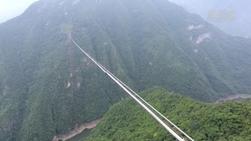 A water pipe stretching over 1,480 meters between two lofty mountains that is suspended 600 meters above the ground has brought safe drinking water to 305 households in a village in Hubei province. (PHOTO / XINHUA)
A water pipe stretching over 1,480 meters between two lofty mountains that is suspended 600 meters above the ground has brought safe drinking water to 305 households in a village in Hubei province. (PHOTO / XINHUA)
A water pipe stretching over 1,480 meters between two lofty mountains that is suspended 600 meters above the ground has brought safe drinking water to 305 households in a village in Hubei province.
Nestled in a Karst landform at an average altitude of 600 meters, Longchi village in Changyang Tujia autonomous county endured water shortages for years. But a water project that was completed in June 2019 meant villagers no longer had to rely on drinking rainwater.
Zhao Lihua, Party chief of the village, said finding a water source for the diversion project was challenging because the village was surrounded by sheer mountains, and water resources were hidden in a secluded corner in deep mountains.
"It took several generations of villagers to find a safe water source that had plentiful clean water rather than rainwater ponds without purification," she said. Village leaders looked for water sources by walking into the mountains while listening for the sounds of water. They used to climb cliffs and covered every inch of land in the village, Zhao said.
In 2018, they heard about a spring that had water all year round in a jungle a little further away. "The stream of water could be as wide as a tea mug even during the driest period," she said.
Wu Daoyuan, a village leader in charge of water safety, and another villager crept along the streamlet to the source of the water, clearing their way with sickles and climbing high up a cliff.
After the water source was found, a gulch 1,500 meters long and 600 meters deep between the source and the village became a new obstacle.
ALSO READ: Uplifting lives with clean water
Liu Shengyong, an official with the county's water resources department, said they decided to build a dangling water pipe to divert the spring water to the village.
We didn't earn much from the project, but we must overcome difficulties to bring clean water to villagers.
Tian Kangji, head of the construction project
"The task is the hardest one I have ever undertaken," said Tian Kangji, head of the construction project that started in August 2018.
Equipment had to be transported by human labor and operated primitively because of the steepness on both sides, Tian said, adding that it took three hours every day just to move equipment up to the construction site on the mountain.
Tian and his team members carried hot water and some dry food with them. "We only had time to eat lunch on a relatively flat area on the cliff while wearing a safety rope," he said.
He was struck by how difficult it was for villagers to drink safe water, as the workers also lived in the village during construction.
"The rainwater they were using and drinking was really dirty," Tian said. "We didn't earn much from the project, but we must overcome difficulties to bring clean water to villagers.
"It was the safest and the most beneficial one, with the smallest investment in similar water-diversion projects."
On June 2, 2019, clean spring water flowed into Longchi through the water pipe. Zhao and the other villagers gathered to witness the moment and even set off firecrackers to celebrate the end of water shortages.
"After the village got access to safe water, many villagers began developing their own businesses rather than working outside," Zhao said, adding that the average annual income of the village is about 8,000 yuan to 9,000 yuan (US$1,230 to US$1,380).
Industries such as growing papaya gradually developed thanks to the flowing water. The village opened a pig farm last year, and more than 10 households now raise pigs for a living, Zhao said.
Zhao Guiyun and her husband plan to expand their pig breeding business this year by raising 200 hogs.
"The water project is helpful. We can drink safe water, and my husband doesn't have to work far away. We earned much more than before," the 40-year-old said.
During the 13th Five-Year Plan (2016-20) period, the county launched 9,692 water supply projects and built 6,500 kilometers of new water pipelines to improve drinking water safety in rural areas, Liu said.
READ MORE: Long-awaited canal stops water shortages
Contact the writer at zhaoyimeng@chinadaily.com.cn


